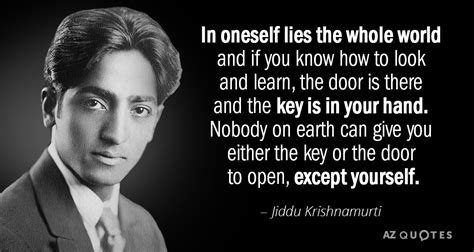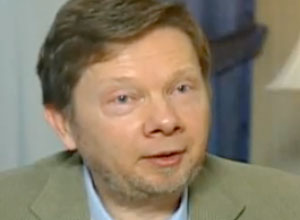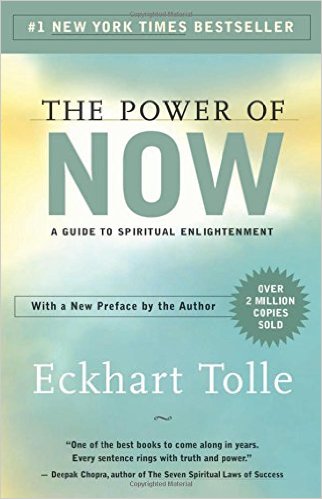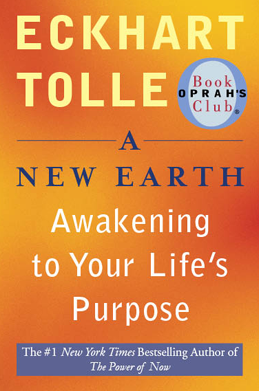|
Word Gems
exploring self-realization, sacred personhood, and full humanity
Happiness
"One is happy as a result of one's own efforts, once one knows the necessary ingredients of happiness - simple tastes, a certain degree of courage, self-denial to a point, love of work, and, above all, a clear conscience. Happiness is no vague dream, of that I now feel certain. By the proper use of experience and thought one can draw much from oneself; by determination and patience one can even restore one's health." George Sand
Mortimer Adler's Syntopicon Essay: Happiness
Editor's 1-Minute Essay: Happiness
Editor's Essay: An Alien's TravelGuide to Earth: Life, the Uncharted World - see the discussion between Eckhart Tolle and Peter Russell on consciousness and happiness
Editor's Essay: What Men Really Want
The great psychologists discuss how the mentally healthy view happiness and life
Anthropologist Dr. J.D. Unwin (Oxford and Cambridge), in his Sex And Culture (1934), reports of 80 primitive tribes and six civilizations through 5,000 years of history, determining a positive correlation between cultural achievement and sexual restraint. "No society has yet succeeded,” he asserts, over an extended period, in regulating the sexual impulse, thus “all societies have collapsed.” Aldous Huxley described Sex and Culture as "a work of the highest importance."
The therapeutic balm of thankfulness: August Goforth: Start with any simple thought of gratitude, which is the mental flint that sparks the flame of feeling. All you have to do is declare that you feel thankful. Do it for everything. It will bring transformation, whether or not you believe this will work doesn’t matter.

| I'd rather be lonely than 'happy' with somebody else |
|
Wikipedia: "Love Me or Leave Me is a popular song written in 1928 by Walter Donaldson with lyrics by Gus Kahn. The song was introduced in the Broadway musical Whoopee!, which opened in December 1928."
|
Love Me or Leave Me
|
say, love me or leave me and let me be lonely, you won't believe me but I love you only, I'd rather be lonely than happy with somebody else, you might find the night time the right time for kissing, night time is my time for just reminiscing, regretting instead of forgetting with somebody else, there'll be no one, unless that someone is you, I intended to be independently blue, say, I want your love, don't wanna borrow, have it today to give back tomorrow, your love is my love, there's no love for nobody else
|
let me be lonely, I intend to be independently blue
Can we bring to mind any other song lyrics with more emotional punch per square metre than Love Me or Leave Me?
there'll be no one, unless that someone is you
READ MORE
|
Dr. August Goforth, “I let God be God in me,” June 08, 2025: “I no longer try to change outer things. They are simply a reflection. I change my inner perception, and the outer reveals the beauty so long obscured by my own attitude. I concentrate on my vision and find my outer view transformed. I find myself attuned to the grandeur of life and in unison with the perfect order of the universe.”
Eckhart Tolle: "People look to time in expectation that it will eventually make them happy, but you cannot find true happiness [simply] by looking toward the future. It's been said there are two ways of being unhappy: One is not getting what you want, and the other is getting what you want."
August Goforth: “The purpose of vibration is emotion. The purpose of emotion is movement (e-motion or energy-in-motion.) The purpose of movement is expansion, exploration and growth. The purpose of expansion, exploration and growth is play. The purpose of play is enjoyment — that is, to bring forth joy. The purpose of bringing forth joy is recreation. The purpose of re-creation is to experience Life.”
Frederic W. H. Myers, in the afterlife, transmitted to Juliet S. Goodenow, Vanishing Night: “You [shall] find whatever you search after. In all the category of experience, you gain what you are searching after — in literature, in art, knowledge, science, invention, love-attainment, in culture, wisdom, riches or treasure… All is accorded you. The spiritual embodiment of your life work is your treasure in Heaven, those laid up by yourself [that is, what you have made of yourself, reflecting your particular talents], your treasures, your mansion, your reward for all you have done on the Earth Plane is laid up by yourself, for yourself, when at last you attain your reward for deeds done in the body. No arbitrary avenging angel awaits you. Creation afforded you in the beginning the implements of industrious labor to satisfy the craving of hunger of the body, and for the satisfaction of the soul. Within your complex organism the Creator placed a guide [that is, your particular desire and sentiment, which reveal destiny] — your passport through the world and through eternity.”
|
When someone hurts or betrays us, how can we forgive in a deep sense, how can we regain an unblemished, pristine image of that person?

Allow me to draw our attention to an extremely important concept introduced in Krishnamurti's lecture of Jan 15, 1964.
He speaks of the unsullied mind, undefiled and unblemished mind. This is a mind, he says, spotless and unpolluted, that is not burdened by sordid images of the past.
And, of course, the most troublesome example here is how we view others. We see them, or might bring them to mind, and immediately recall some insult, a slighting, an infraction.
READ MORE
|
Viktor E. Frankl, Man's Search for Meaning: “Don't aim at success. The more you aim at it and make it a target, the more you are going to miss it. For success, like happiness, cannot be pursued; it must ensue, and it only does so as the unintended side effect of one's personal dedication to a cause greater than oneself or as the by-product of one's surrender to a person other than oneself. Happiness must happen, and the same holds for success: you have to let it happen by not caring about it. I want you to listen to what your conscience commands you to do and go on to carry it out to the best of your knowledge. Then you will live to see that in the long-run—in the long-run, I say!—success will follow you precisely because you had forgotten to think about it.”
|
like a tree growing by a river - leaves always green, never failing to bear fruit

Golden Expressive Landscape oil by Vanya Georgieva
The enlightened person is not immune to the sufferings of this world. And yet, in the midst of unease, there is a sense of needing nothing, a larger perception of abundance and plenitude, a self-sufficiency, a quiet confidence.
One who has discovered the “made in the image” inner riches is ever nourished by Source. This hidden wellspring, an unseen reservoir of refreshment, allows the godly woman or man to prosper, or make the best of any situation, in the difficult classroom that is planet Earth.
Sometimes alone, with a preference for fellowship, but never lonely, and never afraid of death.
READ MORE

watercolor by Tree Landscape Painting Factory
|
Editor's note: Consider what Krishnamurti said about "happiness" in the following passage:

Jiddu Krishnamurti, the famous "dissolution speech," August 3, 1929: "Truth, being limitless, unconditioned, unapproachable by any path whatsoever, cannot be organized; nor should any organization be formed to lead or to coerce people along any particular path… Truth cannot be brought down, rather the individual must make the effort to ascend to it... You are accustomed to authority, or to the atmosphere of authority, which you think will lead you to spirituality. You think and hope that another can, by his extraordinary powers -- a miracle -- transport you to this realm of eternal freedom which is Happiness. Your whole outlook on life is based on that authority... You are all depending for your spirituality on someone else, for your happiness on someone else, for your enlightenment on someone else… Organizations cannot make you free. No man from outside can make you free; nor can organized worship, nor the immolation of yourselves for a cause, make you free; nor can forming yourselves into an organization, nor throwing yourselves into works, make you free… Again, you have the idea that only certain people hold the key to the Kingdom of Happiness. No one holds it. No one has the authority to hold that key. That key is your own self, and in the development and the purification and in the incorruptibility of that self alone is the Kingdom of Eternity. So you will see how absurd is the whole structure that you have built, looking for external help, depending on others for your comfort, for your happiness, for your strength. These can only be found within yourselves. You are accustomed to being told how far you have advanced, what is your spiritual status. How childish! Who but yourself can tell you if you are beautiful or ugly within? Who but yourself can tell you if you are incorruptible?"
|
Why do family members, old friends, and romantic mates drift apart or even abruptly split?
When my daughter was in high school, she had a girlfriend; the two seemed inseparable. Later, the friend chose an alternate lifestyle, assumed that she’d be judged, then abruptly, and permanently, broke off friendship ties.
An example of my own: In the “Evolution” article I recounted that in senior-high English class I’d delivered a speech on the subject of “Creationism versus Darwinism.” Almost all of it, as I now perceive, was error. However, a good friend since childhood disagreed, summarily rejected me, and put me away with no reconciliation.
the hidden cause of all conflict
Each of us, likely, could offer scores of such examples. Krishnamurti’s teachings on the ego – concerning dualism, fragmentation, separation, division – are not of mere academic interest only to professional philosophers. This information holds the sacred key to understanding why planet Earth is the stage for war and conflict, not just on the international level, nor solely with religious or political groups, but also among family members, friends, and lovers.
Why do people drift apart or become immediate enemies? The short answer is that they become an offense to each other. People identify with, make themselves equal to, belief systems which, they assume, will "make me happy." They say "this is who I am," and "this is what I need to be safe and happy," and if you represent something different, their self-image will be threatened, their prospects of safety and happiness will seem to fold - and then you'll be rejected, no matter the strength of former bonds of amity. You'll be rejected because, don't you see, it's a matter of life-and-death to the ego.
the carefully crafted self-image
In his 17.December.1969 lecture, Jiddu Krishnamurti offers one of the most clear and insightful explanations concerning the inner workings of this dark dynamic. When we feel offended by someone, he said, “there is an image about yourself,” one that we ourselves build. This ego-image reflects one's cultural “conditioning.” Why do we build this image? We do so “as a means of security ... of protection ... of being somebody.”
fear is behind the curtain
And what do we find if we draw back the curtain of this ego-image? “Now, if you go behind that," Krishnamurti says, "you will see there is fear.” What is the composition of this fear? It is the existential fear of "I don't have enough" because "I am not enough."
Let’s analyze this ego-image more closely. Why do we build it? What are we protecting? If we allow ourselves to become very still, if we taste and sample the nature of this hidden fear, we will find that we’re protecting a self-image, a mental projection of what the ego would like to be and have:
“I am the person who needs to be seen as virtuous, respected, worthy of honor. And it goes without saying that I know what’s best for you.”
“I am the person who needs to be seen as right and correct. As such, I need you to believe as I do, to agree with all of my religious superstitions, and my self-serving political views. I need you to accept all of my inflexible opinions because your assent makes me feel, not just safe and secure but, that I’m worth something.”
“I am the person who needs to be seen as successful, 'in the know,' and winning. I want you to be impressed with what I am and what I have so that I’ll be counted as a somebody. I need these merit badges so that I can face my peer group, family, and community and be considered important."
“I am the person who craves to be viewed as a wise person, an in-demand friend, a counselor with ‘the answers.’ I count on you to offer me this prestige so that I can feel good about myself.”
"I am the person who grew up on the 'wrong side of the tracks.' My family culture held great disdain for education and knowledge. This disrespect for anything truly progressive has always held me back, creating for me a self-image of 'I’m not smart enough to succeed. I can't get a high-paying job, that's for other people.' And so if you come to me and suggest that, in fact, I do possess talents and strengths, then I will feel very uncomfortable, begin to panic, as you attempt to lead me out of my dysfunctional comfort-zone. At the first sign, with your help, that I I could actually advance myself, I’ll fall apart, swoon in terror, and then begin to blame you, and hate you, before I retreat and crawl back under the safety of my rock."
"I am the person who is comfortable with present ideas. They've gotten me this far (sort of). And they may be half-baked, a straw-house of illogicality, but, even so, these irrationalities offer a certain veneer of meaning to my life. In support of this charade, I surround myself with so-called friends with whom I share a tacit agreement, an unspoken pact: 'You must agree never to point out the non sequiturs of my beggarly superstitions, and I will agree to act as if I accept yours.' That’s the conspiratorial deal. However, if you come along with hard empirical evidence, well-reasoned positions, and suggest that I might want to take a more honest approach to what I believe to be true, well then, I will have to hate you for upsetting the applecart of my entrenched and time-honored unreasonableness."
"I am the person who carries on the traditions of my family. Unfortunately, these are more like peculiar shibboleths, marks of tribal distinction, but not of honor and dignity. I feel duty bound to ask, “What would mother do?” or “This isn’t the way dad did it.” I don’t have enough self-respect to live my own life, follow my own insights, quest for my own meaning and destiny. And if you come along and encourage me to think for myself, to break the apron strings (years after mom passed on), I will feel frightened, disoriented. And then I will blame and hate you for pushing me toward autonomy, full personhood, and self-realization."
“I am the person who needs you to make me happy. You can be my friend/lover/relative if you do exactly what I say and think just as I think. Anything less than this will be threatening to 'who I am.' I need you to love me -- just as I am, with all of my soft-underbelly beliefs -- to compliment me, to defer to me, so that I can judge myself as ok. Don't let me down, I warn you.”
“I am the person associated with you, and if you disappoint me, if you fall short of my expectations - especially after all I've done for you - if you fail to make me happy, if you begin to take on contrary opinions, then you will become an opposing force to what I want and to the image I’ve created for myself. If any of this happens, then, of course, I’ll have to get rid of you, even though we’ve meant much to each other over long years. I'll have no choice but to shun you.”
And so if anyone – sibling, friend, lover, child, parent -- stands as opposition to any of these ego-images, then the offending person will immediately be counted as an enemy, no matter a long history of cordial relation.
a closer look at the hidden fear
We find there’s more than one curtain to open. The ego’s need to be seen as right, virtuous, properly religious or political, is not the only hidden agenda. As one pierces the levels of self-obfuscation we discover the core terror which vivifies all of the ego’s activities. It’s the fear of death. This is the central terror, as we learn from the great psychologists.
This means that when one is attacked, there may be purported surface issues, but the real reason people rage and become apoplectic is the ego fighting for its life. It's identified with, made itself equal to, being right, virtuous, and all the rest, and if it fails to promote itself with these "images," then it will face a kind of psychological death. “Who will I be?” it asks, if these false-security images are minimized or taken away?
the high cost of following the truth wherever it leads
All this is most dire. The reality is, if you assiduously pursue the truth, no matter the cost or where it might lead, then you will lose (for a time) almost every last person who was once close to you. Why must it be so? - because you will become a living, walking threat to another’s carefully crafted self-image.
narrow gate, without fellowship
Editor's note: In his writings, Andrew Jackson Davis warns of the "narrow gate" that leads to life; few be that enter it. Those who live courageously by following the truth wherever it leads, as Davis points out, “will walk a pathway without fellowship of thy earthly brethren.” The cults have long employed the weapon of excommunication, shunning, and ostracization - a forced separation from friends, workmates, and family - toward anyone who disagrees with the hive mentality. This putting away occurs not just in religion but in dysfunctional families, corporations, academia, politics, and other power-seeking groups. They’re afraid of contrary opinion which might disembowel and expose shallow teachings. And so they’ll get rid of you for spreading "misinformation"; and you, as a truth seeker, will be censored and required to make your way through this world “without fellowship of thy earthly brethren.” But, be assured, a day of reckoning is but one missed heartbeat away.
We, ourselves - not some mythical Satan - are the focal point of all evil in the universe. It’s the pathological ego within; it’s the false self, the ego-images, ever attempting to find safety and security for itself, to bolster an inner neediness, the existential emptiness deep within.
We cannot become truly educated, nor reach a good level of wisdom and maturity, in the highest and best sense - or meaningfully prepare ourselves for Summerland or to be with one’s Twin Soul - without understanding the wiles and machinations of our own personal “heart of darkness.”
please, it’s very impolite of you to notice that I lack a self
Soren Kierkegaard: “But in spite of the fact that man has become fantastic in this fashion [i.e., lives unrealistically by denying his own mortality and impending death, the terror of which is covered up by palliatives such as ritualistic, form-based but empty, religion], he may nevertheless … be perfectly well able to live on, to be a man, as it seems, to occupy himself with temporal things, get married, beget children, win honor and esteem – and perhaps no one notices that, in a deeper sense, he lacks [an authentic] self.”
|
Howard Whitman, Success Is Within You: "The trouble comes when we try to fashion our success to the outside world's specifications even though these are not the specifications drawn up in our own hearts... Success, if it is to be meaningful, must be a personal thing... William Faulkner, the Nobel prize novelist, has said, 'I was born to be a tramp. I was happiest when I had nothing. I had a trenchcoat then with big pockets. It would carry a pair of socks, a condensed Shakespeare, and a bottle of whiskey. Then I was happy and I wanted nothing and I had no responsibility.' One may reject this definition of success. That is, one may reject it for himself, but he cannot reject it for Faulkner."
|
Eckhart Tolle, The New Earth
unhappiness is caused by egoic thought-forms

The primary cause of unhappiness is never the situation but your thoughts about it.
Be aware of the thoughts you are thinking. Separate them from the situation, which is always neutral, which always is as it is. There is the situation or the fact, and here are my thoughts about it. Instead of making up stories, stay with the facts.
For example, “I am ruined” is a story. It limits you and prevents you from taking effective action. “I have fifty cents left in my bank account” is a fact.
Facing facts is always empowering. Be aware that what you think, to a large extent, creates the emotions that you feel. See the link between your thinking and your emotions. Rather than being your thoughts and emotions, be the awareness behind them.
Don't seek happiness. If you seek it, you won't find it, because seeking is the antithesis of happiness. Happiness is ever elusive, but freedom from unhappiness is attainable now, by facing what is rather than making up stories about it.
Unhappiness covers up your natural state of wellbeing
and inner peace, the source of true happiness.
|
Dr. Carl Wickland, Gateway To Understanding: "What is the purpose of Life? In this age of unrest and disturbance many earnest minds are seeking the fundamentals underlying life itself. Humanity is still kept in subjection by fear and superstition, by repressive laws, by dogmas, creeds and false doctrines, and has not yet attained liberation through a fuller understanding. Happiness is unquestionably the goal of all human endeavor; all activities have this one aim in view. There are various conceptions of happiness, some confined entirely to physical, others to mental pleasures, while still others reach for spiritual happiness. What is this happiness, sought for through the ages? Happiness is not a thing; it is a condition of mind. This universal search, whether fulfilled or not, must indicate the existence of one Universal Principle, drawing all mankind to one ultimate, common attainment. It is evident that this Universal Principle has projected a visible universe for the purpose of individualizing humanity, and the goal of individualization is the acquirement of wisdom, which can only be attained through experience and reason."
Albert Schweitzer: The kindly doctor ministered to the world's cast-off underprivileged. On his 80th birthday in 1955, admirers raised $20,000 to send him cards, flowers and trinkets in darkest Africa, upon receipt of which the sainted recluse commented: "How I regret all this fuss. How tired I am."
Henry David Thoreau: "A man is rich in the proportions of things he can let alone."
Dale Carnegie, How To Stop Worrying And Start Living: He tells the story of a lady with virtually no eyesight: "Then in 1943, when she was 52 years old, a miracle happened: an operation at the famous Mayo Clinic. She could now see 40 times [better]... A new and exciting world of loveliness opened before her. She now found it thrilling to even to wash dishes in the kitchen sink. 'I begin to play with the white fluffy suds in the dishpan... I dip my hands into them and I pick up a ball of tiny soap... I can see the brilliant colors of a miniature rainbow.' ... You and I ought to be ashamed of ourselves. All the days of our years we have been living in a fairyland of beauty, but we have been too blind to see, too satiated to enjoy. If you want to stop worrying and start living: Count your blessings - not your troubles!"
Albert Camus: “When you have once seen the glow of happiness on the face of a beloved person, you know that a man can have no vocation but to awaken that light on the faces surrounding him; and you are torn by the thought of the unhappiness and night you cast ... in the hearts you encounter."
Buddha: "Happiness comes when your work and words are of benefit to yourself and others."
Martin Luther King, Jr.: We have learned to fly the air like birds and swim the sea like fish, but we have not yet learned the simple art of living together like brothers. Our abundance has brought us neither peace of mind nor serenity of spirit.
John Milton: "The mind is its own place, and in itself, can make heaven of Hell, and a hell of Heaven."
Margaret Bonnano: "It is only possible to live happily ever after on a day to day basis."
Gandhi: "Happiness is when what you think, what you say, and what you do are in harmony."
Hawthorne: "Happiness is as a butterfly which, when pursued, is always beyond our grasp, but which if you will sit down quietly, may alight upon you."
Charlotte Dresser, Life Here And Hereafter (1927): words sent from the Other Side: "I am wishing to tell those on earth, who are struggling to learn what is the meaning of life, that it is the way one looks at it that determines its value. If one thinks of it as a time of sensuous enjoyment, one makes his life a thing of little worth, for such things have no value in the spirit world. If one looks at life as something to be endured and to be gotten through as soon as possible, he will form a character that has nothing to rest on here. He will have to create new foundations before he can advance. If one there believes that life consists in praying and preaching, that spirit is apt to want to pray and preach here; and in this world there are no churches or congregations to respond as they did there, and the spirit has to learn that there are other things to acquire before the true life can be enjoyed. When a soul on earth can realize that there are others there who need assistance, who will be the better for aid and sympathy, and can learn to feel that this aid and sympathy can be given by himself, he is on the way to create the life that will mean the most to him when his mortal life is over."
|
Eckhart Tolle, The Power Of Now
external beauty first makes us happy, then unhappy

"The happiness that is derived from some secondary source is never very deep. It is only a pale reflection of the joy of Being, the vibrant peace that you find within."
We sometimes hear of people who have lost all their money or whose reputation has been ruined committing suicide. Those are the extreme cases. Others, whenever a major loss of one kind or another occurs, just become deeply unhappy or make themselves ill. They cannot distinguish between their life and their life situation.
I recently read about a famous actress who died in her eighties. As her beauty started to fade and became ravaged by old age, she grew desperately unhappy and became a recluse. She, too, had identified with a condition: her external appearance.
First, the condition gave her a happy sense of self, then an unhappy one. If she had been able to connect with the formless and timeless life within, she could have watched and allowed the fading of her external form from a place of serenity and peace.
Moreover, her external form would have become increasingly transparent to the light shining through from her ageless true nature, so her beauty would not really have faded but simply become transformed into spiritual beauty…
The Buddha taught that even your happiness is dukkha - a Pali word meaning "suffering" or "unsatisfactoriness." It is inseparable from its opposite. This means that your happiness and unhappiness are in fact one. Only the illusion of time separates them.
… to seek something [permanent] through [temporary things such as physical beauty] [is dysfunction as] they [cannot offer] - an identity, a sense of permanency and fulfillment – [it’s] a recipe for frustration and suffering… Things and conditions can give you pleasure, but they will also give you pain… they cannot give you joy. Nothing can give you joy. Joy is uncaused and arises from within as the joy of Being… Many people never realize that there can be no "salvation” in anything they do, possess, or attain.
Those who do realize it often become world-weary and depressed: if nothing can give you true fulfillment, what is there left to strive for, what is the point in anything? When you reach this point, you are one step away from despair - and one step away from enlightenment…
This state is then no longer dependent upon things being in a certain way, good or bad… The happiness that is derived from some secondary source is never very deep. It is only a pale reflection of the joy of Being, the vibrant peace that you find within as you enter the state [of awareness of] Being [which] takes you beyond the polar opposites of the mind and frees you from dependency on form. Even if everything were to collapse and crumble all around you, you would still feel a deep inner core of peace.
You may not be happy, but you will be at peace.
|
Frederic W. H. Myers, Vanishing Night, transmitted to Juliet S. Goodenow, 1923: "It is not so much what you will find when you come to this side of life as what you will bring with you... Sleep is the best definition of death I know anything about - just going to sleep unafraid to awake in a new and beautiful room, and to be satisfied."
Mother Teresa: "The Western world will never know peace as long as they continue to allow their mothers to kill their own young."
"I have now reigned about 50 years in victory or peace, beloved by my subjects, dreaded by my enemies, and respected by my allies. Riches and honors, power and pleasure, have waited on my call, nor does any earthly blessing appear to have been wanting to my felicity. In this situation, I have diligently numbered the days of pure and genuine happiness which have fallen to my lot. They amount to fourteen." Abd ER-Rahman III of Spain (960 AD)
|
Eckhart Tolle, The Power Of Now
BEYOND HAPPINESS AND UNHAPPINESS THERE IS PEACE: THE HIGHER GOOD BEYOND GOOD AND BAD

"Seen from a higher perspective, there is no 'good' or 'bad'. There is only a higher good - which includes the 'bad'.
Is there a difference between happiness and inner peace?
Yes. Happiness depends on conditions ["happenings"] being perceived as positive; inner peace does not.
Is it not possible to attract only positive conditions into our life? If our attitude and our thinking are always positive, we would manifest only positive events and situations, wouldn't we?
Do you truly know what is positive and what is negative? Do you have the total picture? There have been many people for whom limitation, failure, loss, illness, or pain in whatever form turned out to be their greatest teacher. It taught them to let go of false self-images and superficial ego-dictated goals and desires.
It gave them depth, humility, and compassion. It made them more real. Whenever anything negative happens to you, there is a deep lesson concealed within it, although you may not see it at the time. Even a brief illness or an accident can show you what is real and unreal in your life, what ultimately matters and what doesn't.
Seen from a higher perspective, conditions are always positive. To be more precise: they are neither positive nor negative. They are as they are. And when you live in complete acceptance of what is - which is the only sane way to live – there is no "good" or "bad" in your life anymore. There is only a higher good - which includes the "bad."
Seen from the perspective of the mind, however, there is good-bad, like-dislike, love-hate. Hence, in the Book of Genesis, it is said that Adam and Eve were no longer allowed to dwell in "paradise" when they "ate of the tree of the knowledge of good and evil."
This sounds to me like denial and self-deception. When something dreadful happens to me or someone close to me - accident, illness, pain of some kind or death - I can pretend that it isn't bad, but the fact remains that it is bad, so why deny it?
You are not pretending anything. You are allowing it to be as it is, that's all. This "allowing to be" takes you beyond the mind with its resistance patterns that create the positive-negative polarities…
For example, when a loved one has just died, or you feel your own death approaching, you cannot be happy. It is impossible. But you can be at peace. There may be sadness and tears, but provided that you have relinquished resistance, underneath the sadness you will feel a deep serenity, a stillness, a sacred presence.
This is the emanation of Being, this is inner peace, the good that has no opposite.
What if it is a situation that I can do something about? How can I allow it to be and change it at the same time?
Do what you have to do. In the meantime, accept what is. Since mind and resistance are synonymous, acceptance immediately frees you from mind dominance and thus reconnects you with Being. As a result, the usual ego motivations for "doing" - fear, greed, control, defending or feeding the false sense of self - will cease to operate. An intelligence much greater than the mind is now in charge, and so a different quality of consciousness will flow into your doing.
"Accept whatever comes to you woven in the pattern of your destiny, for what could more aptly fit your needs?" This was written 2,000 years ago by Marcus Aurelius, one of those exceedingly rare humans who possessed worldly power as well as wisdom.
Editor's note: In "The Wedding Song" Kairissi and Elenchus discuss the issue of "there is no 'bad' when viewed from a higher perspective," that of God as Singular Pervasive Reality.
|
|







